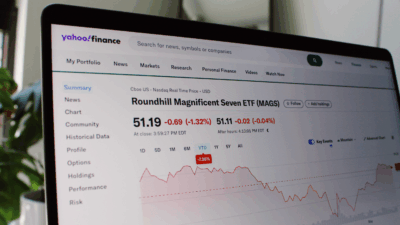Farewell (For Now, At Least) to Tesla’s $700 Billion Trump Bump
Tesla’s stock closed down for a record seventh consecutive week on Friday, and has nearly erased a $700 billion post-election rally.

Sign up for smart news, insights, and analysis on the biggest financial stories of the day.
It’s not always a lucky number.
Tesla’s stock closed down for a record seventh consecutive week on Friday, and has nearly erased a $700 billion post-election rally. While the increasingly scrutinized role of CEO Elon Musk in the federal government is one factor, it is — to borrow a phrase from James Carville — the electric vehicle market, stupid, that’s causing the biggest concerns for investors.
A World of Pain
After President Donald Trump won the November election, investors excitedly hopped on board Tesla like a family cramming into a Model Y for a beach vacation. The premise was simple: Musk’s firm, with its CEO as the president’s chief benefactor and trusted advisor, was positioned to reap a windfall. Already a dominant player in the electric vehicle space, it also had a heavily publicized autonomous vehicle technology rollout on the horizon, one that access to the levers of government could certainly help with.
That bet has, so far, been a bust. Tesla’s stock shed 28% in February, the second-worst month in its history (by comparison, the S&P 500 lost just 2% last month). Musk’s role as a senior White House advisor, which has put him in charge of dramatic federal spending cuts, has led to concerns about potential reputational pitfalls. Not since Leatherface has anyone been so closely associated with an oversized chainsaw. Tesla, however, has sustained even more painful blows — in the global electric vehicle market that is the source of its cash flow. Data increasingly shows not one, not two, but at least three major markets shifting gears and turning away to competitors:
- Data released last week showed Tesla’s sales of China-made electric vehicles fell 49% year-over-year in February to 30,000, or the lowest point in over two years. In the same year-over-year time period, electric vehicle sales in China rose 82%.
- A similar trend is underway in Europe: According to the European Automobile Manufacturers’ Association, only 9,945 new Tesla EVs were registered on the continent in January, a 45% decrease from 18,161 last year. Overall EV sales rocketed 37% at the same time, suggesting strong demand that Tesla is failing to capture. And, in Australia, Tesla sales fell 72% year-over-year in February.
What the Street Says: At least two leading Wall Street firms slashed their price targets for the Musk-led company last week, meaning they think Tesla’s issues aren’t going to be fixed any time soon. Robert W. Baird cut its outlook on Tesla by 16% to $370, noting the recent data indicating sliding sales “lead us to believe there is risk to the consensus Q1 delivery estimate” of 437,500 vehicles. Bank of America slashed its price target 22% to $380, citing slower European sales and worries about “the brand potentially souring.”











